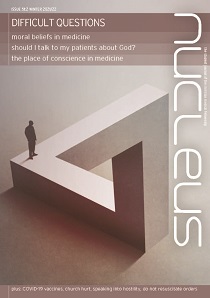Only a year ago, there was no vaccine available against COVID-19. The development and rollout of such vaccines in some parts of the world has been remarkable, with some countries achieving very high rates of coverage. However you interpret Covid-related figures in the UK, it is difficult to deny that a significant reduction in hospital admissions and deaths at a given Covid infection rate has occurred following the introduction of the vaccines. Yet there is some suggestion that Christians are more hesitant about vaccines than others. Is this true, and if so, why might that be?
are Christians more likely to avoid Covid vaccines?
A wide-ranging survey in the USA has tracked self-reported vaccine uptake among a variety of groups during the pandemic. The most recent September 2021 report [1] makes for concerning reading. Vaccine uptake among 'white evangelical Christians' is low at 62 per cent, compared with 72 per cent in the general population. The proportion of Christians who say they will 'definitely not' have the vaccine is higher, at 20 per cent, compared with twelve per cent in the general population. Of course, there are confounders for such figures, notably in this case an even more stark distinction between self-identifying Republicans and Democrats, but the difference is clear nonetheless. Anything so detailed is difficult to find for the UK, but it is interesting to note that Northern Ireland, which is generally perceived to have much higher numbers of churchgoers than most other parts of the UK, has shown lower uptake figures than other areas, although differences are not large. [2] Causation is of course hard to prove on either side of the Atlantic.what leads to vaccine hesitancy?
The term 'anti-vaxxer' is often not helpful, and if used at all is often applied to those resolutely opposed to Covid (or any other) vaccines. In my own clinical experience, this small minority is almost impossible to convince. But there are many wider factors that affect uptake, some of which can be remedied and lead to increased vaccination rates in the hesitant. Particularly important is trust in information received about vaccines, but even things as simple as the logistics of booking an appointment, or availability of time off work to be vaccinated can have an impact. When governments procure vaccines and have a big role in their distribution, trust in government will also affect vaccine uptake. This may be linked to concerns about government overreach, perhaps understandable given the level of legal restrictions on people's private lives during the pandemic, but this scepticism can spill over into increasingly far-fetched conspiracy theories.These are often by their nature very hard to discuss rationally, although thankfully unusual in the UK. There is also some understandable concern about vaccine side-effects, particularly given reports of thrombocytopaenia accompanied by thromboembolic events following administration of the AstraZeneca vaccine. [3] Though this is very rare, with a drug given to millions of people, 'very rare' will still mean a number of cases do occur, some of which may be life-changing for the individuals concerned. For much of the population the risks of contracting COVID-19 are clearly greater than the risks of side-effects from vaccines. Such concerns may weigh more heavily with healthy teenagers and young adults, who are much less likely to become seriously ill due to COVID-19. I discuss a Christian response to this later in this article.
are there specific factors for Christians?
Christians are just as affected by common reasons for vaccine hesitancy as anyone else. Several more specific areas could be leading to increased hesitancy.- views on health and healing
- pressure in churches
- wider Christian pressure
- ethical concerns about the vaccines themselves
The COVID-19 vaccines currently in circulation have been either manufactured or tested using a cell line called HEK-293. These cells were derived from an abortion more than 50 years ago. The abortion was not performed for the cause of creating the cell lines; they were effectively a 'by-product'. Any cells growing in this line today will be many divisions removed from the aborted tissue and contain none of the original tissue. However, some have still expressed significant concerns about this. Some of these can be easily dealt with (such as patently false claims that individual vaccine doses contain aborted tissue). But the question of complicity in the original abortion, which many Christians will see as evil, has led some to refuse the vaccines on these grounds. The counterargument has been that not taking the vaccine will do nothing to prevent an abortion which happened many years ago, and indeed may cost, rather than save, lives. I also have concerns about the consistency of taking this view. The HEK293 cell line is not confined to use in COVID-19 vaccines. Matthew Schneider, writing from a Catholic perspective, lists many common medicines where testing has involved these cell lines. [4] If we avoid the vaccines for this reason, logically we avoid all these medicines too. Even if we don't have concerns ourselves, it is clear that some do, and it would surely be helpful in the future if cell lines could be produced and used that do not carry these ethical concerns.
- concerns about distribution of vaccines
While the rollout of vaccines has been very successful in some countries, there has been wide variation across the world in vaccination rates. The UN 'COVAX' program aimed to obtain doses of vaccine and distribute these according to a formula that looked not only at the size of a country's population, but also at age distribution, number of healthcare workers, etc. [5] This program has enabled the distribution of some vaccines, but not at enough of a pace to avoid claims that richer countries have 'hoarded' vaccines for their own populations. Although Christians may not have a consensus on the exact mechanics of distributing vaccines, most would agree that an even distribution across the world is sensible from both a justice and a pandemic management perspective. For most this won't affect their own decision about taking a vaccine, but we have had some approaches from groups wanting CMF to support petitions that would have encouraged people in the UK to refuse booster vaccine doses until there was more roll-out in the developing world.
how should a still-unvaccinated Christian decide?
I think the principles drawn from two Bible verses are key in understanding this: Matthew 25:40, and Romans 14:23. Matthew 25:40 says, 'Truly I tell you, whatever you did for one of the least of these brothers and sisters of mine, you did for me.'A widely applied Christian principle has been that the strong should make sacrifices for the weak. If we assume that vaccines have at least some effects on reducing Covid transmission, then it logically follows that being vaccinated should reduce the chances of people who may not respond to the vaccine becoming severely ill from infection. Even if we are sceptical of the effect of vaccines on reducing transmission, it is much harder to deny an effect on serious illness. Assuming that we believe lockdown measures were genuinely put in place because of strain on healthcare systems, then reducing serious illnesses should reduce the risk of such measures (the devastating economic impact of which is increasingly apparent, particularly on the poorest) ever recurring. Accepting a vaccine when we can seems to fit the principle of Matthew 25:40. This argument is important for healthcare students, who are a good example of a group who are on average young and usually at low risk of serious illness because of Covid but who have a lot of contact with more vulnerable people.
The sense of most of the CMF Office team has been that most members we've spoken to have been happy to be vaccinated and have encouraged others to do so. However, we're aware of a minority who are very uncomfortable with COVID-19 vaccines for various reasons, perhaps most often around the fetal cell line issue discussed above. It is important that we consider this view carefully to ensure that those who hold it are fairly treated. Some prominent figures support this view, perhaps most notably in the evangelical world the widely respected speaker and author John Piper [6] (although he has more recently emphasised Christian freedom on the matter). [7] In the UK, Brephos (among others) have advocated a similar position. [8] Although this would be a minority view, some may also feel strong conscientious concerns about whether harm may come in future. In these cases of difficulty, Paul's injunction that 'everything that does not come from faith is sin' (Romans 14:23) surely applies, given that Paul himself was discussing differences in matters of conscience in the passage. It is then for each believer to weigh the implications of these two principles and work out what they will do. While we may well wish to discuss and try to persuade, we need to respect the conclusions of others.
conclusions
Many of the reasons that have put some Christians off COVID-19 vaccines are no different to anyone else's. A small number of 'Christian specific' reasons may be understandable, even for those who don't share them. Therefore, as the wider church, we need to be understanding, and defend the right of acting according to conscience for Christians who sincerely believe that they should, even if this is on an issue where we may not agree.Laurence Crutchlow is CMF Associate Head of Student Ministries and a GP in London
































